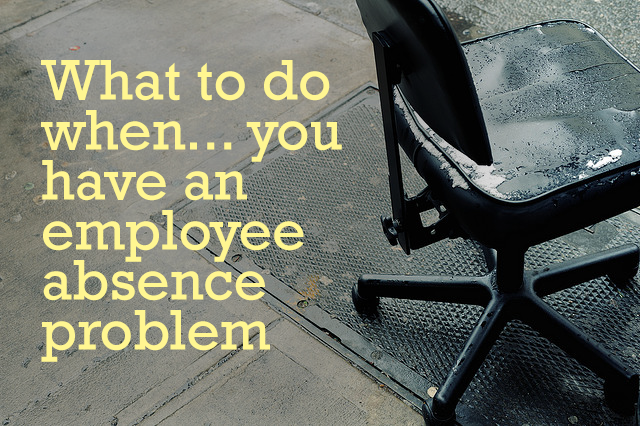
Staff absence is a significant problem for any employer. In the UK alone, it is estimated that staff sickness costs businesses around £16 billion per annum.
So, what can be done to tackle this issue? Are there things we can do to improve staff absence rates?
You will never eliminate staff absence, but I believe if you have clear methods in place to monitor, support, measure and deal with staff absence, staff members will feel more supported, empowered and secure in the workplace. And as a result, your absence rates should reduce.
The starting point is to recognise that both employees and employers have a responsibility for staff welfare. The individual has a responsibility to keep themselves fit and healthy to be able to work. The employer has a responsibility to ensure a healthy working environment and to provide support to employees. In other words, it’s a team effort to work together to find a solution.
There are many reasons for staff absence and it is important to understand the reason so that you can propose the most appropriate course of action. Some absences have specific statutory rules and rights; such as pregnancy, maternity, long term sickness. Make sure you are aware of any specific rights or seek professional advice if you are unsure.
Here are my top tips to help minimise absence and encourage a happy, healthy workforce!
- Have a clear policy in place and communicate it!
We have a written absence management policy for staff, it sets out the requirements if a staff member is going to be absent and explains the impact that staff absence has on the business, and why the company has a policy to manage it.
Our absence management policy is very simple:
Step 1 – employees must notify the company of their absence.
Step 2 – employees who have been absent from work have a ‘return to work’ meeting with their line manager as soon as they return.
Step 3 – After a number of absences, an employee will be invited to a formal investigatory meeting, conducted by their line manager.
Step 4 – if an employee has multiple investigatory meetings and/or they have not followed any of the steps agreed to reduce their absence, they may be invited to a disciplinary meeting.
This simple policy ensures that staff absence is pro-actively managed. It also ensures everyone is treated fairly and sympathetically and communicated with at every stage.
- Track Absence and take action
It is important to apply the absence management policy consistently. Make sure it applies to all employees at all levels, train managers in how to conduct effective and supportive return to work and investigatory meetings and make sure all the correct paperwork is completed and filed.
- Look after your employees at work
We work in spa industry so we should be the experts when it comes to taking care of our employee’s wellbeing!
We all know the common ailments that blight our industry and it is our responsibility to do everything we can to protect our staff when they are at work.
This requires a ‘no compromise’ approach. Make sure all equipment and premises are fit for purpose and in full working order, all health and safety testing, audits and documentation are carried out in a timely manner, staff are fully trained to do the job they are being asked to do and all staff receive monthly one to one time with their manager to discuss any issues with their job.
These steps may sound rather basic, but they are vital if you expect your staff to be healthy and happy. Many occupational health issues can be avoided by better communication, listening to staff concerns, and pro-actively resolving any ongoing issues. A healthy workplace is a happy workplace and this in itself can have a significant impact on reducing staff absence.
- Take a pro-active approach
In addition to ‘the basics’ above, we also provide staff benefits such as free use of facilities, discounts on products and treatments, a monthly loyalty treatment and free flu vaccines. This shows staff that we care about them, and invest in their health and wellbeing. When staff see what the company is willing to do for them, they feel encouraged and motivated to take more responsibility for their own health and wellbeing.
We focus on creating a fun working environment which encourages teamwork and team participation. For example we have a staff social fund where the company donates money every month for team nights out. The more proud and involved and supported team members feel, the happier they feel and they are less likely to be off sick.
We also promote flexible working, as often issues arise due to an inappropriate work life balance, and a change in working patterns can make all the difference. There is a need to have a flexible approach to each situation.
Whilst it is important to have a clear and consistent policy, we treat every staff member as an individual. What works for one person will not work for another, and its important to take each case individually and find a solution that works for both the business and the staff member.
There is no magic bullet, but a pro-active, well communicated and supportive approach can work wonders to keep staff absence to a minimum.
This article appears in the March/April edition of World Spa & Wellness Magazine. To obtain a free digital copy of the magazine click on the link below:
http://worldspawellness.com/site/LatestIssue
References: http://www.personneltoday.com/hr/sickness-absence-rates-and-costs-revealed-in-uks-largest-survey/
